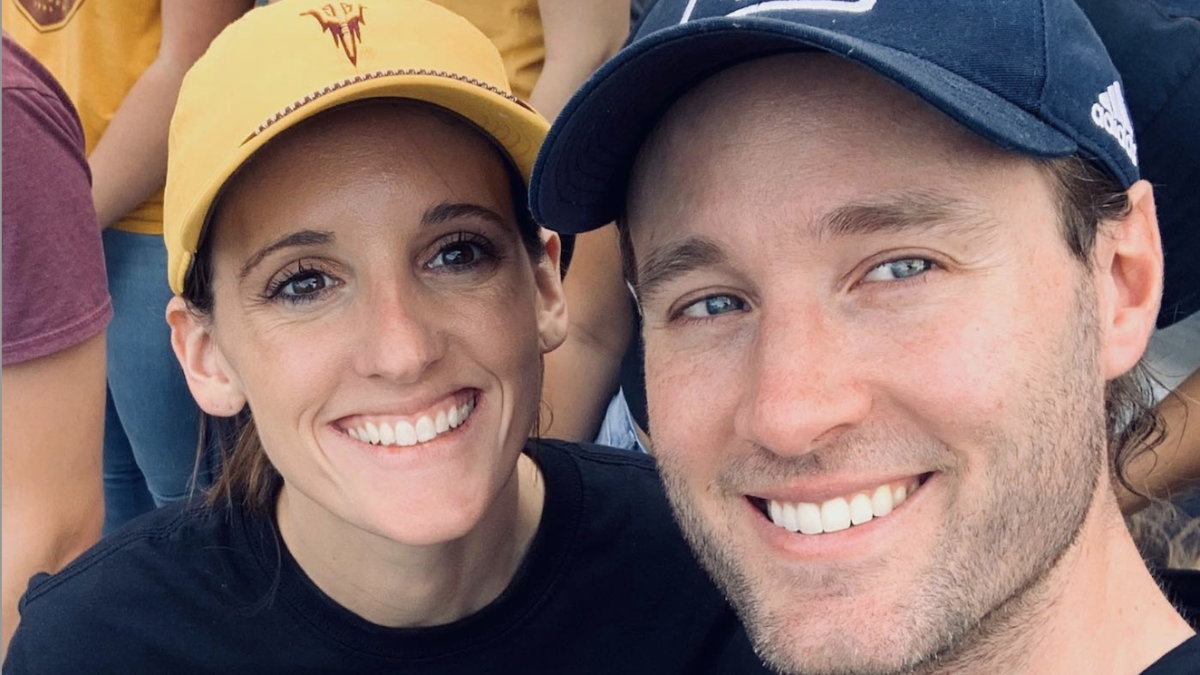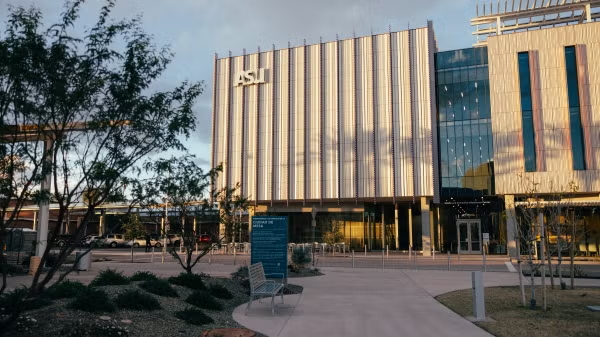History PhD graduate reaches ‘top of the mountain’ in studies

Robert Fuller (pictured with his wife, Thia Fuller, who works at ASU as a career development specialist at the Ira A. Fulton Schools of Engineering's career center) earned his PhD in history through the School of Historical, Philosophical and Religious Studies.
Editor’s note: This story is part of a series of profiles of notable fall 2023 graduates.
Robert Fuller applied to ASU’s history PhD program for the Tempe sunshine, but he ultimately chose ASU because of its reputation as the most innovative academic university in the world.
Fuller, who came to ASU with a master's degree in history from the University of Texas-Arlington, knew he would continue to focus his research on apocalypticism — a unique interdisciplinary field — and ASU offered him the means to do so.
“I arrived at ASU with a clear research goal,” Fuller said, “Climate change is the most pressing and apocalyptic threat facing humanity, but scientists in general appear to struggle with communicating this urgency and need for action to the general public. As someone who grew up among fundamentalism, I knew that preachers were historically very effective in communicating apocalyptic urgency and — most importantly — translating that urgency into action.”
However, as Fuller continued his studies, he found unexpected inspiration, particularly in courses with Gaymon Bennett, associate professor of religious studies and director of the Lincoln Center for Applied Ethics.
“Professor Bennett was never afraid to get weird — he actively encouraged it,” Fuller said. “And it was possibly the best thing that happened for me as a developing scholar.”
Fuller’s dissertation ultimately changed, but his attitude toward the shift was met in stride.
“History is messy,” he said.
Here are some highlights from our Q&A with him:
Question: What was your "aha" moment when you realized what you wanted to study?
Answer: I began my career as a direct-care social worker at residential treatment facilities for troubled and abused adolescents. I often logged 80-hour weeks, and when I met my wife I realized that I would need to find a less physically and emotionally exhausting line of work. I still wanted to be involved in helping young people improve themselves, and I had a pretty good memory, so I decided to transition to high school education and become a history teacher.
In pursuit of this new profession, I enrolled at the University of Texas-Arlington and earned my master’s degree in history in 2013. By the start of 2014 I was not only teaching history but also serving as the chair of the social studies department at a private high school. I absolutely loved my time with those students, and I wore many hats at the school including coaching various athletics. However, by far the most fulfilling moments were there in the classroom helping students to realize just how complex the past is and how it defies the simple stories society and its culture wars often present us with. Nearly a decade later, just about every one of my former students can still recall the class motto: "History is messy."
By the summer of 2016, I had come to the conviction that I wanted to spend the rest of my life teaching and exploring history — and if I was going to make it my life's duty, then I wanted to earn the highest credential in the field: a PhD.
I wanted to know that I had pushed myself to the top of the "history" mountain and had endured anything I might ever ask a student to do.
Now, as I near the end of my studies at ASU, I have also come to see just how important a compassionate understanding of history is to sustaining any democracy. As someone who was raised as a Christian fundamentalist on a compound awaiting the apocalypse (very conservative) and who has worked as a social worker (very liberal), I do occupy a unique position as someone who can speak to people across the political divide and — most importantly — help to explain in human terms how various groups have come to their own interpretations of the past. Passing along this compassionate understanding to students equips them for the kind of sustainable democracy that can resist conspiracy and purity tests.
Q: What's the best piece of advice you'd give to other students?
A: For history students: Were you just assigned a book from a field that you know nothing about? Be sure to take a look at a few book reviews (JSTOR is your friend) before you dive in blind. You will get 10 times more out of the book if you start with a clear understanding of what makes that book unique and important.
For ASU students: Coming to a university as large as ASU is like stepping into a national park. On the one hand, your opportunities will be almost limitless. On the other, you can get lost easily. That's why it's important to find your guides and stick close to them.
For anyone pursuing higher education: It's cliched, but no one cares how much you know until they know how much you care. (I do my best to keep this in mind while teaching my classes here at ASU.)
Q: What is your favorite spot on campus, whether for studying, meeting friends, or otherwise? Tell us about a place on campus that is special to you.
A: Best place to study: the top floor of Noble Library in the very last study room.
Most meaningful spot: the bench between McClintock Hall and Hayden Lawn (in front of the big cactus). My wife and I were sitting on that bench together listening on speakerphone as the doctor informed us that we would be having a healthy baby boy.
Q: What are your plans after graduation?
A: Teach history! This year I served as the host for the "Study Hall: Modern World History" YouTube series produced in collaboration between ASU and Crash Course. So perhaps there will be future opportunities to produce accessible (and humorous) history content. In any case, whether it is in-person or online, at a major university like ASU or a close-knit private high school, I will be helping students explore the past and develop greater empathy for those with whom they share the present.
More Arts, humanities and education

Award-winning playwright shares her scriptwriting process with ASU students
Actions speak louder than words. That’s why award-winning playwright Y York is workshopping her latest play, "Becoming…

Exceeding great expectations in downtown Mesa
Anyone visiting downtown Mesa over the past couple of years has a lot to rave about: The bevy of restaurants, unique local shops…

Upcoming exhibition brings experimental art and more to the West Valley campus
Ask Tra Bouscaren how he got into art and his answer is simple.“Art saved my life when I was 19,” he says. “I was in a…

